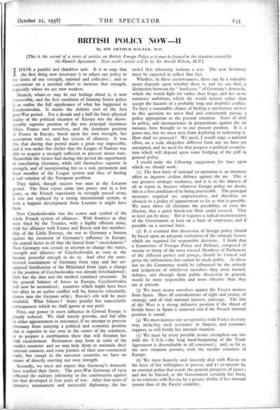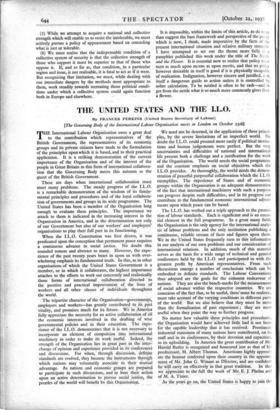BRITISH POLICY NOW-II
By SIR ARTHUR SALTER, M.P.
[This is the second of a series of articles on British Foreign Policy as it must be framed in the situation created by the Munich Agreement. Next week's article will be by Sir Arnold Wilson, M.P.] T HAVE a painful and thankless task. It is to urge that 1 the first thing now necessary is to adjust our policy to the limits of our strength, national and collective ; and to concentrate on a national effort to increase that strength, especially where we are now weakest.
Munich, whatenr may be our feelings about it, is now irreversible, and the first condition of framing future policy is to realise the full significance of what has happened to Czechoslovakia. It marks the definite end of the first post-War period. For a decade and a _half the basic physical reality of the political situation of Europe was the incon- testably superior position of the two principal victorious Allies, France and ourselves, and the dominant position of France in Europe, based upon her own strength, her association with us, and her system' of alliances. It was this that during that period made a great war impossible, and it was under this shelter that the League of Nations was able to acquire a strength sufficient to prevent minor wars. Meanwhile the victors had during this period the opportunity of conciliating Germany, while still themselves superior in strength, and of incorporating her as a real, permanent and loyal member of the League system and thus of finding a real solution of the European problem.
They failed, though success was near at the Locamo period. The Nazi regime came into power and in a few years, as the French superiority in strength passed away, it was not replaced by a strong international system, as with a happier development from Locarno it might have been.
Now Czechoslovakia was the centre and symbol of the whole French system , of alliances. With frontiers as they were flied by, the Treaties, with a highly efficient army, with her alliinCes with France and Russia and her member= ship of the Little Entente, she was to Germany a bastion against the extension of Germany's influence in Europe, the central fador in all that she feared from " encirclement." Nazi .Germany was certain to attempt to change the status, strength. and .alliances of Czechoslovakia as soon as she became Powerful enough to do so. And after the unre- stricted rearmament of Germany from 1935 and her un- opposed fortification of the Rhineland from 1936, a change in the position of Czechoslovakia was already foreshadowed ; little but the date and the method remained uncertain. In the general balance of forces in Europe, Czechoslovakia will now" be neutralised ; countries which might have been her allies in an earlier conflict will be, however reluctantly, drawn into the German orbit ; Russia's role will be more doubtful. What follows ? Some painful but unavoidable consequences which we shall ignore at our peril.
First, our power to exert influence in Central Europe is greatly reduced. We shall merely provoke, and fail alike in either appeasement or resistance, if we attempt to prevent Germany from enjoying a political and economic position that is superior to our own in the centre of the continent, or to prepare a combination there that will threaten her with encirclement. Resistances may form in some of the smaller countries and we may help them to maintain their external contacts, and some portion of their non-continental trade, but except in the sea-coast countries we have no means of directly exerting our own strength.
Secondly, we must not expect that Germany's demands have reached their limits. The post-War Germany of 1919 reflected the military inferiority to the combination against her that developed in four years of war. After four years of intensive rearmament and successful diplomacy, she has ended that inferiority without a war. The new Germany must be expected to reflect that fact.
Whether, in these circumstances, there can be a tolerable peace depends upon whether there is, and we can find, a distinction between the " hard-core " of Germany's demands, which she would fight for rather than forgo, and her more extensive ambitions, which she would restrict rather than accept the hazards of a probably long and doubtful conflict.
To have a reasonable chance of finding a satisfactory answer to this question we must find and consistently pursue a policy appropriate to the present situation. Years of drift in policy, and incompetence in preparations against the air menace, have brought us to our present position. It is a grave one, but we must turn from deploring to redressing it. How shall we proceed ? We need, I would urge, a national effort, on a scale altogether different from any we have yet attempted, and we need for that purpose a political co-opera- tion which will depend upon some bridging of the gulf in general policy.
I would make the following suggestions for lines upon which we should work : (a) The best basis of national co-operation is an intensive effort to improve civilian defence against the air. This is our greatest strategic weakness, and it is to the interest of all to repair it, because whatever foreign policy we desire, this is a first condition of its being practicable. The principal measures required are unprovocative, and therefore no obstacle to a policy of appeasement so far as that is possible. We must above all eliminate the possibility, or even the illusion, that a quick knock-out blow could succeed. That at least can be done. But it requires a radical reconstruction of the Government at least on a basis of competence, and if possible on a national basis.
(2) It is essential that discussion of foreign policy should be based upon an adequate realisation of the strategic factors which are required for responsible decisions. I think that a Committee of Foreign Policy and Defence, composed of twenty or thirty of the most trusted Members of Parliament of the different parties and groups, should be formed and given the information that cannot be made public. As those not on the Committee would be influenced by the attitude and judgement of whichever members they most trusted, debates, and through them public discussion in general, would be more responsible and more effective than they are at present.
(3) We must secure ourselves against the Fascist menace from Spain. Here all considerations of right and justice, of strategy, and of vital national interest, converge. The line of the West is a strong defensive position if the threat of hostile bases in Spain is removed and if the French internal position is sound.
(4) We must increase our co-operation with France in every way, including such assistance in finance, and economic support, as will fortify her internal situation.
(5) We must by every possible means strengthen our ties with the U.S.A.—the long hard-bargaining of the Trade Agreement is discreditable to all concerned ; and, so far as the new situation permits, with the smaller countries of Europe.
(6) We must honestly and sincerely deal with Russia on the basis of her willingness to pursue, and t) co-operate in, an external policy that assists the general prospects of peace ; and not be biassed, as the Government certainly has been, in its relations with Russia, by a greater dislike of her internal system than of the Fascist countries. (7) While we attempt to acquire a national and collective strength which will enable us to resist the intolerable, we must actively pursue a policy of appeasement based on conceding whatis just or tolerable. (8) We must realise that the indispensable condition of a collective system of security is that the collective strength of those who support it must be superior to that of those who oppose it. If, and so far as, that condition,_in a particular region and issue, is not realisable, it is fatal to act as if it were. But recognising that limitation, we must, while dealing with our immediate dangers by the methods most appropriate to them, work steadily towards recreating those political condi- tions under which a collective system could again function both in Europe and elsewhere. It is impossible, within the limits of this article, to do in ire than suggest the bare framework and perspective.of the policy which is_ now, I think, made imperative by the facts of the present international situation and relative military strength. I have attempted to set out the theme more fully in a pamphlet published this week under the title of The Nettle and the Flower. It is essential now to realise that policy mutt turn as much upon means as upon merits, and that no policy however desirable in itself is good if it is physically incapable of realisation. Indignation, however sincere and justified, is in itself a dangerous guide to action unless it is controlled by siaber calculation. To be nettled is often to be rash--and to get from the nettle what it so much more commonly gives than a flower. . _
















































 Previous page
Previous page